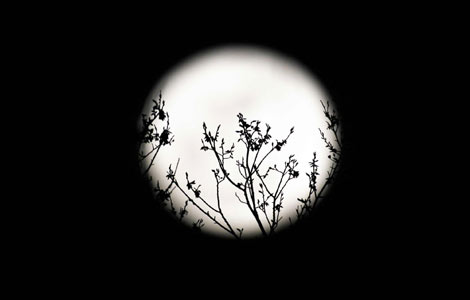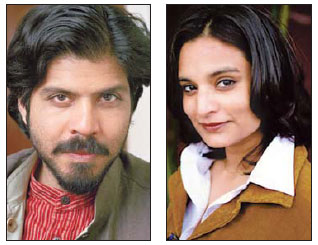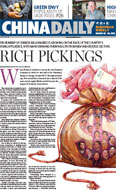Books
Reading China from an Indian perspective
Updated: 2011-03-11 08:07
By Chitralekha Basu (China Daily)
|
Indian authors Pankaj Mishra (left) and Pallavi Aiyar bring stories related to China to the country's literary festivals. Photos Provided to China Daily |
"China is becoming everybody's business," says Douglas Kerr, professor of English at Hong Kong University. And that includes a handful of writers and intellectuals from India - a country that has had a long and layered relationship with China.
As dozens of authors arrive in the country to the several literary festivals, two Indians among them have engaged with China in a big way.
Pankaj Mishra, who has been interpreting the idea of Asia in postcolonial times in books like Temptations of the West and An End to Suffering: the Buddha in the World, has had a sustained scholarly interest in China for almost a decade.
Now working on a jaw-droppingly ambitious project, tentatively-titled The Awakening in Asia and the Remaking of the Modern World, Mishra is essentially looking at how writers, intellectuals and ideologues from across Asia "confronted the challenge of Western imperialism and Western modernity in the late 19th and early 20th centuries".
Mishra's trip has been a literary-intellectual pilgrimage of sorts.
He has paid homage to the writer Lu Xun (1881-1936) at his family home in Shaoxing, Zhejiang province.
He exchanged notes with Liang Congjie (1932-2010), who was the soul of the environmental group Friends of Nature and a grandson of the great scholar and philosopher Liang Qichao (1873-1929), who tried to reform the decaying Qing Dynasty (1644-1911).
Mishra is fascinated by Confucian philosopher-writer Liang Shuming (1893-1988) and finds Liang's rural reconstruction experiment in the 1930s resonating with Indian political and ideological leader M.K. Gandhi's ideas of community living.
He has also found friends among contemporary practitioners of art and literature: the writers Yu Hua and Wang Anyi, the filmmaker Jia Zhangke, who, Mishra says "is writing the history of the present".
In his opinion, what unites contemporary writers with their early 20th-century counterparts - who played a significant role in "the way China arrived at Communism in the middle of the 20th century" and "what China is today" - "is the almost moral anxiety about what China is going to become".
While the younger generation of writers may not often display a similar sense of the past, Yu Hua, who grew up during the years of the "cultural revolution" (1966-76) and grew out of it, has a very "fraught and complicated, relationship" with his parent country, Mishra says.
Journalist-turned-novelist Pallavi Aiyar's engagement with China was the consequence of a series of eventualities. She followed her Spanish boyfriend Julio Arias, then an EU intern in Beijing, whom she had met at the London School of Economics, landed herself a job teaching journalism instructors at Beijing Broadcasting Institute and then suddenly found herself reporting the SARS epidemic in 2003 from ground zero for a prestigious Indian television company.
Even as she "was reporting the biggest story in the world to which no Indian media had direct access", Aiyar was also drawn to the other striking features in China, that often do not get reported outside of the country.
"I was fascinated by the flow of life on the streets, people practicing tai chi in the park, taking domesticated birds out for fresh air. It was amazing to see how profound and fast the changes were in a culture that managed to retain the core of Chinese-ness."
Aiyar wanted to bring this less-heard-of story to an Indian audience, and started writing for two Indian national newspapers.
Smoke and Mirrors, her first book, grew out of the newspaper dispatches. "It was the classic foreign correspondent text and also a memoir, a look at the big themes affecting China today, from a base that's different from the Western perspective," Aiyar says.
While the standard Western response to Chinese cities is that they are seething with pollution, corrupt officials and crazy driving, an Asian could well take "a dramatically opposite view of the same thing", as these things are often considered "normal" in Indian society.
Ultimately the book ended up being a little bit about India as well, says Aiyar, "about why India is such a different 'creature' from China".
Aiyar's just-published novel, Chinese Whiskers, though totally different in tone and tenor from her first, is in many ways an accompanying piece. Told from the viewpoint of two cats, Soyabean and Tofu, adopted by an expat couple living in a hutong neighborhood of once-imperial Beijing, it's a modern fable about contemporary China, touching on subjects of great social import - the stoicism of the older generation, the aspirations of the new, the impact of SARS and tainted pet-food scandals.
With Chinese Whiskers, Aiyar wanted to attract young readers as well, hence the fable format.
"I also wanted to normalize the discourse on China," she says. "A lot of people still see the culture as peculiar. But all these things about generation gap, disparity in income, clash between modernity and tradition are relevant to any big developing country. I just wanted to universalize the experience."
E-paper

City of Joy
Welcome to the 'world of smiles' where life meanders slowly.
Debate on nuclear power revived
The future is now
Common approach
Specials

Beloved polar bear died
Berlin's beloved polar bear Knut, an international star died Saturday.

Panic buying of salt
Worried Chinese shoppers stripped stores of salt on radiation fears.

'Super moon'
The "Super Moon" arrives at its closest point to the Earth in 2011.

